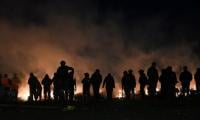Agenda for 2022
We are closing on the current year and the new year is round the corner. It is worth pondering over what the agenda for 2022 for Pakistan should be. In a newspaper article, one cannot flush out too many details due to the limited space but one can point to some highlights.
Democracy needs to deepen in the country in the real sense. The local bodies elections that have started being conducted is good news. However, the opposition parties are too compromised due to corruption cases against them and have not been able to mount an effective resistance against the government. The opposition should not shy away from confrontation with the government and should be willing to pay the price of the confrontation. Parliament needs to be made an effective decision-making body in the country and both the government and the opposition need to work towards it.
There is a need to strengthen the peace lobby in the country. Efforts to normalise relations with India should pick up steam. The Subcontinent needs the peace dividend. Increased trade with India will be beneficial for Pakistan’s economic development. The peace movement needs to be seen in the larger context as well. Chomsky has time and again pointed out that nuclear weapons and climate change are two major threats to world peace. The global nuclear disarmament debate needs to be revived as well as its application in the world including India and Pakistan.
As one has written time and again, the future of Pakistan lies with urbanisation. Pakistan is the most urbanised country in South Asia and urbanisation is leapfrogging at a great pace in the country. Literature points out that there is an agglomeration impact in the urbanisation process, which is another way of labeling economies of scale.
Industrial development often takes place in clusters. These industrial clusters are formed in the urban areas. They pool labour and other resources and costs are brought down and productivity is increased. There are networks of essential services that facilitate the production process and the cost of living for the labour. So networks of social and physical capital flourish in urban areas. Therefore, there is a need for policymakers to view urbanisation from the point of view of the economies of scale and link it to social and economic development.
It is often said that Pakistan has missed the industrialisation phase that could transform its economy. We still produce low value added textiles and other goods. With CPEC, Pakistan can pick up steam on industrial development. It is important that the government facilitates the industrial development-focused phase of CPEC.
Moreover, we are living in the age of the knowledge economy. Pakistan’s youth bulge can be its big asset. It would be good if we focused on the knowledge industry and earned foreign exchange based on knowledge-based exports. There is a need for further research on Artificial Intelligence and the gig economy and its application in the country.
Women’s participation in the labour force is crucial; it was only 22 percent in 2019. As stated in this space, women’s labour force participation is decreasing in Pakistan, even if marginally. This trend needs to be reversed. No country can develop unless half of its population actively participates in social, political and economic development. There are enough reports and literature that have analysed the reasons behind low women’s labour force participation. The government needs to pay attention to policy prescriptions and work towards a more gender-balanced labour force.
Pakistan has made great strides on women’s political participation. Our parliament and provincial assemblies have effective women’s representation, even if it is on the basis of quota, and women are also given some space in the local bodies. Women legislators have played an effective role in pushing pro-women legislation in the past. Even on other counts, the performance of women legislators has been impressive. There is a need to consolidate these gains in women’s political participation and to build on them.
Housing is another area that needs attention. As urban planners have been pointing out; annual supply of urban housing is much less than the demand, particularly for low-income groups. Vertical growth of housing in the cities needs to be promoted, so that more people can be accommodated in less space. The property sector should be properly taxed to end the speculative trends that make urban housing less affordable for many. Informal settlements of the poor need to be regularised by the government to promote equity.
The list is endless. One could go on with the list of priorities. The list given above is not exhaustive by any means. It just points to some issues worth considering. As has been often pointed out in this space, there is a need for long-term planning for the country from the people’s perspective.
The peace dividend and socio-political and economic development need to be materialised. Pakistan is endowed with resources and a young workforce. Effective planning and careful consideration of short, medium, and long-term development goals can transform the country. Both the government and the opposition parties need to work towards developmental goals.
There is also a need for homegrown knowledge production. The Planning Commission needs to be linked to knowledge centres in the country, so that research on social science issues can feed into policymaking and implementation. Only a good knowledge-planning-implementation nexus can deliver this agenda.
The writer is an Islamabad-based social scientist. She can be reached at: fskcolumns@gmail.com
-
 'Bridgerton' Season 4: Showrunner Talks About Violet's Steamy Romance
'Bridgerton' Season 4: Showrunner Talks About Violet's Steamy Romance -
 John Tesh Recalls ‘uncomfortable’ Backlash Over ’70s Romance With Oprah Winfrey
John Tesh Recalls ‘uncomfortable’ Backlash Over ’70s Romance With Oprah Winfrey -
 Meghan Markle, Prince Harry Problem Was Not ‘work’ During Time With Royals
Meghan Markle, Prince Harry Problem Was Not ‘work’ During Time With Royals -
 Meta Strikes Multi-billion-dollar AI Chip Deal With Google: Will The New Collaboration Pay Off?
Meta Strikes Multi-billion-dollar AI Chip Deal With Google: Will The New Collaboration Pay Off? -
 Gracie Abrams Breaks Silence After Losing 2026 BRIT Award
Gracie Abrams Breaks Silence After Losing 2026 BRIT Award -
 Deon Cole Takes Swipe At Nicki Minaj In Mock Prayer During NAACP Image Awards Monologue
Deon Cole Takes Swipe At Nicki Minaj In Mock Prayer During NAACP Image Awards Monologue -
 Jennifer Garner Reveals The Actress Who 'carried Through Things'
Jennifer Garner Reveals The Actress Who 'carried Through Things' -
 Shamed Andrew ‘awful’ Time As Trade Envoy Is Laid Bare By Insider
Shamed Andrew ‘awful’ Time As Trade Envoy Is Laid Bare By Insider -
 Belgium Seizes Suspected Russian Shadow Fleet Tanker
Belgium Seizes Suspected Russian Shadow Fleet Tanker -
 Liza Minelli Makes Bombshell Claim About Late Mother Judy Garland’s Struggle With Drugs
Liza Minelli Makes Bombshell Claim About Late Mother Judy Garland’s Struggle With Drugs -
 Shipping Giant Maersk Halts Suez Canal, Bab El-Mandeb Sailings Amid Escalating Conflict
Shipping Giant Maersk Halts Suez Canal, Bab El-Mandeb Sailings Amid Escalating Conflict -
 Matthew McCoughaney Reveals One 'gift' He Achieved With Losing Nearly 50 Pounds
Matthew McCoughaney Reveals One 'gift' He Achieved With Losing Nearly 50 Pounds -
 'Scream 7' Breaks Box Office Record Of Slasher Franchise: 'We Are Grateful'
'Scream 7' Breaks Box Office Record Of Slasher Franchise: 'We Are Grateful' -
 Bolivian Military Plane Crash Death Toll Rises To 20
Bolivian Military Plane Crash Death Toll Rises To 20 -
 'Sinners' Star Blasts Major Media Company For 2026 BAFTAs Incident
'Sinners' Star Blasts Major Media Company For 2026 BAFTAs Incident -
 Inside Scooter Braun, Sydney Sweeney's Plans To Settle Down, Have A Baby
Inside Scooter Braun, Sydney Sweeney's Plans To Settle Down, Have A Baby



